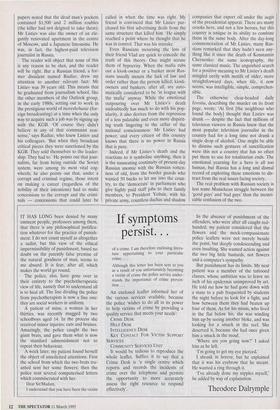If symptoms
persist. . .
IT HAS LONG been denied by many eminent people, professors among them, that there is any philosophical justifica- tion whatever for the practice of punish- ment. I do not count myself as altogether a sadist, but this view of the ethical impermissibility of punishment, based no doubt on the patently false premise of the natural goodness of man, seems to me absurd. It is fear, after all, which makes the world go round.
The police, alas, have gone over in their entirety to the psychotherapeutic view of life, namely that to understand all is to heal all. The line dividing the police from psychotherapists is now a fine one: they are social workers in uniform.
A patient of mine, a woman in her thirties, was recently mugged by two schoolboys aged 14. In the process she received minor injuries: cuts and bruises. Amazingly, the police caught the two giant brats, and gave them what is now the standard admonishment not to repeat their behaviour.
A week later, my patient found herself the object of unsolicited attentions. First the school from which the two brats tru- anted sent her some flowers; then the police sent several computerised letters which commiserated with her.
Dear Sir/Madam, I understand that you have been the victim of a crime. I am therefore enclosing litera- ture appertaining to your particular crime . .
Although this letter has been sent to you as a result of you unfortunately becoming a victim of crime the police service under- stands the importance of crime preven- tion .
An enclosed leaflet informed her of the various services available, because the police 'wishes to do all in its power to help victims of crime by providing a quality service that meets your needs':
CRIME DESK HELP DESK INTELLIGENCE DESK KEY CONTACT FOR VICTIM SUPPORT SERVICES COMMUNITY SERVICES UNIT It would be tedious to reproduce the whole leaflet. Suffice it to say that a Crime Desk is 'a single centre which reports and records the incidents of crime over the telephone and permits the opportunity to more accurately assess the right resource to respond effectively'.
In the absence of punishment of the offenders, who were after all caught red- handed, my patient considered that the flowers and the mock-compassionate police leaflets were not merely beside the point, but deeply condescending and even insulting. She wanted action against the two big little bastards, not flowers and a computer's sympathy.
But punishment has its limits. My next patient was a member of the tattooed classes, whose ambition was to leave no inch of his epidermis unimproved by art. He told me how he had gone down with a mate to a pub frequented by students the night before to look for a fight, and how between them they had beaten up four of them. As for his missis, who lived in the flat below his, she was winding him up by seeing another bloke, and was looking for a smack in the tea She deserved it, because she had once given him a smack in the mouf.
`Where are you going now?' I asked him as he left.
`I'm going to get my eye pierced.'
I shrank in horror, but he explained that it was his eyebrow that he meant. He wanted a ring through it.
`I've already done my nipples myself,' he added by way of explanation.
Theodore Dalrymple


























































 Previous page
Previous page